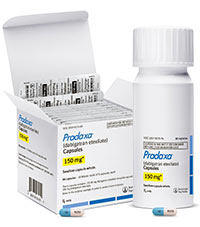“Pradaxa For Atrial Fibrillation? Heart Valve Disease? Mechanical Heart Valve Replacements?” Asks Gene
By Adam Pick on April 10, 2011
I’ve received several questions about the use of Pradaxa as a potential Coumadin-substitute for patients with atrial fibrillation, valve disease and/or mechanical heart valve replacements. I am a “better safe than sorry” type guy, so I wanted to make sure our patient community was on the same page specific to this new anticoagulant.

For those of you unfamiliar with Pradaxa, it was approved by the FDA in October, 2010. Following the results of its RE-LY study, Pradaxa is now considered by some to be an alternative to Coumadin — an established anticoagulant (blood thinner) for preventing strokes in patients with atrial fibrillation. During the RE-LY trial, patients with atrial fibrillation taking Pradaxa had fewer strokes compared to those using Coumadin.
In light of this news, patients in our community – including Gene – sent me questions about Pradaxa. I contacted Dr. Niv Ad, a leading cardiac surgeon at White Oak Medical Center in Takoma Park, Maryland, to learn more about this drug and its potential utility for patients with mechanical heart valve replacements.
So you know, Dr. Ad is known within the medical community for his unique research and treatment of atrial fibrillation. A testament to his patient advocacy efforts, Dr. Ad hosts an annual reunion for his patients who have had cardiac surgery due to a-fib.

I asked Dr. Ad four questions about Pradaxa and heart valve-related issues.
Question 1: How effective has Pradaxa been for patients suffering from A-Fib?
Pradaxa (Dabigatran) is an ORAL direct thrombin inhibitor indicated for stroke prevention in patients with non-valvular atrial fibrillation. Pradaxa is supplied as a capsule (75mg and 150mg) which is taken by mouth twice daily based on renal function (150mg twice a day for Creatinine Clearance> 30 ml/min; 75mg twice a day for Creatinine Clearance 15 – 30 ml/min). As always — with these types of statements, patients should follow their own physician instructions. Patients on Pradaxa who cannot swallow the capsule should be switched to another anticoagulant. Pradaxa does not require regular monitoring to assess its effectiveness. Again, it is important to note, It is important to note, the drug is indicated only in patients with atrial fibrillation and no valvular disease! — Dr. Niv Ad
Question 2: Is Pradaxa safe?
The drug is safe and approved for use by the FDA for the indications mentioned. However, the studies showed the following: In a study comparing Pradaxa to Coumadin, more Pradaxa patients developed gastrointestinal bleeding but fewer developed intracranial bleeding than warfarin patients. Bleeding is a risk with any anticoagulant. Dyspepsia can be an issue with Pradaxa but patients may take an H2 blocker (famotidine) or a proton pump inhibitor (pantoprazole) if it’s bothersome. — Dr. Niv Ad
Question 3: If patients have a mechanical heart valve replacement, can I use Pradaxa instead of Coumadin?
“NO!” — Dr. Niv Ad
Question 4: If I have A-Fib and a mechanical heart valve replacement, can I take Pradaxa?
“NO!” — Dr. Niv Ad
Considering Dr. Ad’s responses to questions #3 and #4, I quickly came to see understand the appropriate uses of this drug relative to our patient community. In closing, Dr. Ad stressed, “Pradaxa, like Coumadin, is an anticoagulant and as such should only be taken under doctor’s order with an appropriate prescription.”
I hope this helps us all learn about Pradaxa relative to patients with atrial fibrillation, heart valve disease and/or mechanical heart valve replacements. Thanks to Gene for the questions. And, a special thanks to Dr. Niv Ad for sharing his clinical expertise.
Keep on tickin!
Adam
|
Andrew Wrigley says on April 11th, 2011 at 11:36 am |
|
I guess the question is: Why is Pradaxa NOT indicated for anticoagulation for Mechanical Heart Valves? Is it because it has not been tested yet? Andrew |
 |
|
Kathy Jamison-Patnode says on April 11th, 2011 at 1:38 pm |
|
According to my primary care doctor… Pradaxa IS approved for mechanical valve patients IN EUROPE only. He said it may be another 5 years before it is approved here in the US. I told him sign me up for any research studies here in the US involving patients like me who have mechanical valves. I for one would love to not have to worry about what I eat or getting my blood tested all the time. Maybe we need to lobby the FDA to get it approved sooner. |
 |
|
Robert says on April 12th, 2011 at 6:00 am |
|
One would think if Europe approves a drug, it should take less time for FDA to approve the same drug in the US? |
 |
|
Andrew Wrigley says on April 12th, 2011 at 7:28 am |
|
I am living in the UK thanks to a mechanical mitral valve. I am still on warfarin, and although there have been mutterings about pradaxa from my doctor, it is still very much pie in the sky. |
 |
|
Patricia says on April 12th, 2011 at 9:04 am |
|
Could someone explain why one Consultant says Pradaxa is suitable for a patient who has a mechanical heart valve and another says it is unsuitable. What is the explanation for this? If the blood is the right consistency – which is surely what this is all about -we are at a loss to understand the logic here. Explanation greatly appreciated. Many thanks. Patricia |
 |
|
Andrew Wrigley says on April 12th, 2011 at 9:10 am |
|
Europe and the US have two very different health systems. Without getting into that debate, I would say that Europe is more likely to approve Pradaxa quicker than the US given european countries’ concerns with the cost of their health services. If pradaxa, that does not require the costly the testing that warfarin / coumadin requires (this testing is free in the UK), is the cheaper option, then it is likely to be approved quickly once it is shown to be relatively safe. The US can afford to wait. The benchmark will be US approval for me. I note that this is a very personal opinion! I am no expert in any of these matters. |
 |
|
Diana McMichael says on April 13th, 2011 at 2:24 pm |
|
Six weeks after mitral valve repair surgery due to extreme regurgitation in August 2010, my heart developed a-fib. I was on 5mg Coumadin daily until two weeks ago, when I switched to Pradaxa. Even though I have a history of ulcers caused by H Pylori bacteria, so far all is going well. I would love to stay on this new drug, but I have a question about the valvular disease issue. Since my leaking valve has been repaired, am I not considered to have valve disease? A recent echocardiogram shows minor leaking in the repaired mitral valve and mild to moderate leaking in the tricuspid and aortic valves. However, my cardiologist says these may never need to be repaired. I mostly want to be reassured that Pradaxa is safe for me to take. |
 |
|
Kelly says on July 18th, 2011 at 10:06 pm |
|
My husband had his valve replace 18 years ago and has been on coumadin since. Recently the family Doctor decided to change him to taking Pradax because all of a sudden his INR levels were not staying constant. He only had to have blood test once every 3 months, but then started to have them weekly after 18 years. He was on Pradax for the last 2 1/2 months and recently suffered a stroke….. he his still in the rehabilitation hospital. If you have a mechanical valve I wouldn’t take the chance in changing your medication of Coumadin! I wish we hadn’t!!!! He is only 51 years old! |
 |
|
joe robertson says on August 3rd, 2011 at 4:08 pm |
|
I have a tissue aorta valve,eat anything i want to, and my INR is a constant 2.5 have my finger poked once a month. i was very afraid to take warfarin at first.now it does not bother me at all.Also when they did the valve replacement surgery they did what they call a maze procedure on my heart so the blood does not pool if and when i go into a-fib. |
 |
|
Susan Hoggatt says on August 5th, 2011 at 11:00 am |
|
I have had a mechanical St. Jude Valve since 1993 (age 28). I am now 46 years old. I can only hope that this drug will be approved to replace this rat poison that I have been putting in my body for the last 18 years! I am not so worried about the constant blood sticks. I am more concerned as to what is happening to me physically. Thin is becoming very thin, my shortness of breath from the lack of oxygen that I am not receiving because of my blood being thin. Bruising! !8 years is enough! I would love to have this drug approved before I am 50! All in all, I have to say. I eat everything I want to but in moderation. Those people that stay away from foods that they love because they say foods interact with the drug, well let me just say….That is why have your blood checked regularly. As long as you are not sitting down eating a spinach salad everyday of the week and having broccoli as your side veggie every meal, jus remember moderation is the key! If you are staying away entirely, it’s your loss! |
 |
|
Harvey Hodson says on August 7th, 2011 at 4:57 pm |
|
I have a mechanical aorta valve that I received in 2007. My INR stayed ok for the first year, then I started having problems. My INR was all over the place. Any time it got as high as a 4 I would have internal bleeding, end up in the hospital, and get a blood transfusion. After several emergency room visits and being admitted to the hospial, my Dr put me on Pradaxa. I have been on pradaxa for 2 months now and so far I havent had a problem. I have an appointment with my cardiologist on the 18th of August. I’m sure he will leave me on Pradaxa. While I may be a test subject, I really don’t feel I had any choice. I know people that have took warfarin for 30 years and never had a problem. I envy those folks. |
 |
|
Stormy Baucom says on September 8th, 2011 at 3:14 pm |
|
I had aortic valve replacement surgery in April of 2009. I am on Warfarin 8 mg per day. My INR has stayed around 2.5 for the last 2 years and 5 months. Only one time did it shoot up to 6.7 and I was hospitalized. I stil don’t know what caused it but doing fine now. I don’t mind the monthly blood tests because at least I know where I stand with my PT/INR. It would scare the beJesus out of me not knowing what those numbers were on a monthly basis as I draw solace from this information. The same kind of weird solace I get from hearing that St Jude valve clicking away. So I guess what I am saying is even if Pradaxa is approved for heart valve patients, I wouldn’t take it. |
 |
|
Maritza Stevenson says on September 15th, 2011 at 4:24 am |
|
I had valve replacement surgery in 1987 and have been on warfarin since then – dosage has been between 7 and 8mg per day and my INR fluctuates between 3 and 4 depending on what I have been eating or doing – I was hoping to be able to take pradaxa but having read all the articles I think I will stay with warfarin – it becomes a part of your life and I think the regular checks and minor restrictions on what you can eat is a small price to pay for being alive. |
 |
|
Robyn says on October 6th, 2011 at 1:50 pm |
|
I had aortic valve replacement surgery, as well as an aneurysm repair in August 2010. I have been on warfarin since. I am a 27 year old female and have had a lot of trouble keeping my INR stable. I do have my own INR machine at home to check it myself with just the prick of a finger. It’s definitely hard to handle being young and wanting to have children and being on this medication. Luckily there are options that I can switch to, but Pradaxa isn’t one of them. But I am thankful to have had the surgery because if I didn’t, I wouldn’t be here. |
 |
|
Todd White says on November 2nd, 2011 at 11:53 am |
|
Reading the literature re: Pradaxa, the anticoagulant effect CANNOT be quickly reversed as with warfarin. That would worry me. |
 |
|
Harvey Hodson says on November 5th, 2011 at 7:24 pm |
|
I have been on pradaxa for 5 months now as an anti coagulate for my mechanical heart valve. I havent had any problems at all. I had abdominal surgery October 12, and not a problem with bleeding at all. I went off pradaxa 4 days before the surgery. I wish I could tolerate warfarin, but luckily the pradaxa is working great. |
 |
|
Todd White says on November 18th, 2011 at 6:37 pm |
|
I wonder why Dr. Ad is so emphatic re: the contraindication of Pradaxa for use with Mech. Valves ? |
 |
|
Harvey Hodson says on November 26th, 2011 at 10:52 pm |
|
Todd, My cardiologist knew I was spending way too much time in the |
 |
|
Todd White says on December 22nd, 2011 at 8:05 pm |
|
Harvey, I just had my yearly cardio check-up and I quizzed my cardiologist about Pradaxa. He told me that Pradaxa was only submitted to the FDA as adjutant therapy for AF. In the U.S., it costs a tremendous amount of money to bring a new drug to market. Atrial Fibrillation was the best economic route to get this drug approved. It would cost much more to also get it approved for knee and hip replacemnt and mechanical valve patients, as we are a small group compared to AF patients which are quite numerous. |
 |
|
Evo Gamboni says on September 25th, 2012 at 11:10 am |
|
Reading through the posts I notice the impatience of some folks to get on Pradaxa & off Coumadin. All I can add is relax. The little bit of trouble associated with Coumadin is well worth it. Trust me on this one folks, I was off Coumadin for many years following mitral repair. |
 |
|
Rob R says on January 17th, 2013 at 3:00 pm |
|
Thanks for sharing the update from the drugwatch website about the study investigating the use of Pradaxa for patients with mechanical valves. I’d been curious about it’s progress and whether it would lead to FDA approval of the medication for mech valve patients. So, no approval likely it seems, at least for now. I wonder if any similar study is under way or planned for the drug Xarelto (from Bayer). Being on Warfarin has taken some adjustments but is definitely manageable. I would want any potential anticoagulation drug to be fully investigated and approved for use with mech valves before I would consider switching to it. |
 |
|
Chuck Rietz says on January 26th, 2013 at 6:59 pm |
|
why not use Natokinanse to thin blood instead of Warferin? I t is plant based and has less negative side effects, yet has proven to keep blood thin eough to avoid stroke. |
 |
|
todd says on February 3rd, 2013 at 5:32 pm |
|
Where did you learn that Natokinase can replace coumadin in Prosthetic valve patients? |
 |
|
Harvey Hodson says on February 9th, 2013 at 8:29 pm |
|
I have had 4 strokes in the last 4 months. My cardiologist took me off Pradaxa and went back to coumadin. The cardiologist believed the Pradaxa caused the strokes. |
 |
|
frank says on February 10th, 2013 at 11:50 pm |
|
I had my aortic valve replaced by a mech valve(St.Jude’s) and an aortic anueyrsm repaired on 4/28/2010.That was also my 70th birthday. I have been on 3.5 mg of warfarin since that time. My INR has been mostly stable at 2.7-3.0 with monthly check ups. The only problem was when I had an infection treated with an antibiotic. The INR went to 7.0 but with a few daily and weekly blood checks it was under control. I was worried about the life time of warfarin when I chose the mech valve but I have adjusted to that routine. I do mostly what I did before the surgery but at a slower and more careful pace. I golf several days a week (usually 18 holes). I have been reading about Pradaxa but for now I will stick with the warfarin. This blog has been a great source of infomation and comfort. My thanks to all of you who are willing to share your problems and successes. |
 |
|
joe robertson says on July 2nd, 2013 at 3:59 pm |
|
my aorta valve was replaced with a porcine tissue valve in 2006.after a while doc put me on warfarin at first i was i was not liking the idea,but then it became a normal way of life.one day in july of 2012 i had a bloody nose,and lost about 2 pints of blood.did not like that and swore that i would not take warfarin again.instead i started taking pycnogenol.my doctor did not like the idea not knowing what the supplement is all about.pycnogenol is pine bark from the maritime pine tree in france.it thins your blood 5 times more than asprin,and does not let your blood platelets stick togeather.it is a very stong antioxident as well as an anti inflamatory.all the side effects are a plus.the rule of thumb on how much to take is according to you weight.150 mg per day is what i take.i don’t think you could get away with taking it if you have a mecanical valve,because your blood needs to be thinner |
 |
|
Darlene Adams says on October 14th, 2013 at 7:36 pm |
|
I also have a mechanical mitral valve and a pacemaker and had to go off pradaxa and back on Coumadin and I hate it. They should get moving on testing these new drugs for people with mechanical valves. I just turned 60 and I hate having blood tests all the time and watching every piece of lettuce I put in my mouth. My cardiologist and pc doctors said Pradaxa is used in Europe and the US just doesn’t want to spend the money on testing. I would like to know more about Eliquis suppose to be better than Pradaxa. Will we ever get off of the rat poison Coumadin? |
 |
|
Joyce Dennis says on June 15th, 2014 at 9:16 pm |
|
I had Rhuematic Fever at age 14 leaving me with mitral stenosis. At age 67, I started having symptoms. Including shortness of breathe,tiredness and ended up having a cow valve implanted.i developed atrial fib in the hospital and was started on Coumadin. After 3months I was in regular rhythm and was taken off the Coumadin..then 2months later I was back in atrial fib. It was then my cardiologists put me on Prodaxa.I travel a lot and it was great not having to get blood work done. I have had no problem with Prodaxa. But. Recently I have heard on TV that people with artificial valve should not take Prodaxa.It has been4 years since my surgery and. I have been on Prodaxa 31/2years. Should I just leave this alone or what? I surely do noy want to have a stroke. I am in excellent health and am 71years old with no other serious problems. |
 |
|
Evo Gamboni says on July 17th, 2014 at 6:44 am |
|
I underwent a mitral repair in 1996 & subsequent testing revealed no need for blood thinner. |
 |












